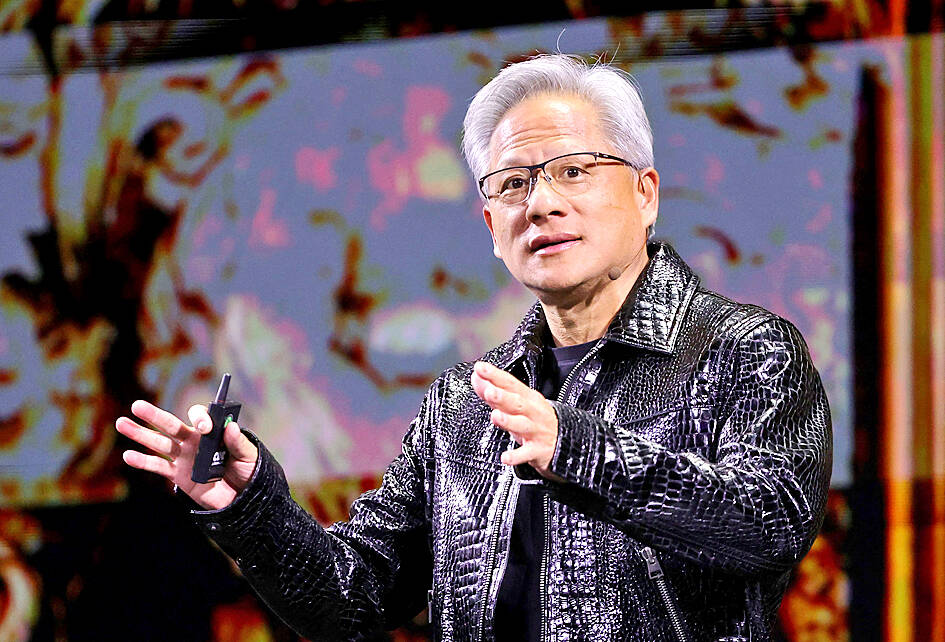Nvidia Corp cofounder and chief executive officer Jensen Huang (黃仁勳) on Tuesday said he is ready to meet US president-elect Donald Trump and offer his help to the incoming administration.
“I’d be delighted to go see him and congratulate him, and do whatever we can to make this administration succeed,” Huang said in an interview with Bloomberg Television, adding that he has not been invited to visit Trump’s home base at Mar-a-Lago in Florida yet.
As head of the world’s most valuable chipmaker, Huang has an opportunity to help steer the administration’s artificial intelligence (AI) policy at a moment of rapid change. Nvidia is looking to speed the deployment of advanced AI systems around the world — much of which depend on its industry-leading chips.

Photo: Reuters
Trump has said that he would impose trade tariffs that might affect companies like Nvidia, which rely heavily on overseas sales and outsourced manufacturing. Nvidia already faces restrictions that prohibit some of its most capable — and lucrative — chips from being exported to China, the biggest market for semiconductors.
“We will give them as much insight as we can from our perspective,” Huang said. “I am sure the administration will make the right moves.”
The remarks follow a wide-ranging product unveiling on Monday that included new chips, software and services.
Nvidia is looking to maintain its edge in AI computing after explosive growth over the past two years.
The Santa Clara, California-based company has said that AI would fuel a new industrial revolution, and Huang envisions a world with 1 billion humanoid robots, 10 million automated factories and 1.5 billion self-driving vehicles.
During a separate question-and-answer session at the CES in Las Vegas, Huang said he expected Trump to bring less regulation.
“I think that’s a good thing,” he said. “As an industry, we want to move fast.”
Meanwhile, Huang stopped short on Tuesday of confirming that his company was going to set up an overseas headquarters in Taiwan, but did say the company needed to expand its office space there.
“We have a lot of employees in Taiwan today, and the building is too small, so I have to do something about that...We’re looking for real estate,” he said at the CES conference when asked about the headquarters idea.
Huang added that he could “announce something” at the Computex trade show, which is slated for May 20 to 23 at the Taipei Nangang Exhibition Center.
Huang had previously teased the idea of building a headquarters in Taiwan in June last year during last year’s Computex, without providing any further details.
In addition to visiting Taiwan during Computex, Huang said his next trip to Taiwan would be to attend the Lunar New Year party of the Nvidia Taiwan office, which is scheduled for Friday next week.
It is an annual tradition for him that he looks forward to, he said.
Additional reporting by CNA

Taiwan Semiconductor Manufacturing Co (TSMC, 台積電) yesterday said that its investment plan in Arizona is going according to schedule, following a local media report claiming that the company is planning to break ground on its third wafer fab in the US in June. In a statement, TSMC said it does not comment on market speculation, but that its investments in Arizona are proceeding well. TSMC is investing more than US$65 billion in Arizona to build three advanced wafer fabs. The first one has started production using the 4-nanometer (nm) process, while the second one would start mass production using the

When an apartment comes up for rent in Germany’s big cities, hundreds of prospective tenants often queue down the street to view it, but the acute shortage of affordable housing is getting scant attention ahead of today’s snap general election. “Housing is one of the main problems for people, but nobody talks about it, nobody takes it seriously,” said Andreas Ibel, president of Build Europe, an association representing housing developers. Migration and the sluggish economy top the list of voters’ concerns, but analysts say housing policy fails to break through as returns on investment take time to register, making the

‘SILVER LINING’: Although the news caused TSMC to fall on the local market, an analyst said that as tariffs are not set to go into effect until April, there is still time for negotiations US President Donald Trump on Tuesday said that he would likely impose tariffs on semiconductor, automobile and pharmaceutical imports of about 25 percent, with an announcement coming as soon as April 2 in a move that would represent a dramatic widening of the US leader’s trade war. “I probably will tell you that on April 2, but it’ll be in the neighborhood of 25 percent,” Trump told reporters at his Mar-a-Lago club when asked about his plan for auto tariffs. Asked about similar levies on pharmaceutical drugs and semiconductors, the president said that “it’ll be 25 percent and higher, and it’ll

CHIP BOOM: Revenue for the semiconductor industry is set to reach US$1 trillion by 2032, opening up opportunities for the chip pacakging and testing company, it said ASE Technology Holding Co (日月光投控), the world’s largest provider of outsourced semiconductor assembly and test (OSAT) services, yesterday launched a new advanced manufacturing facility in Penang, Malaysia, aiming to meet growing demand for emerging technologies such as generative artificial intelligence (AI) applications. The US$300 million facility is a critical step in expanding ASE’s global footprint, offering an alternative for customers from the US, Europe, Japan, South Korea and China to assemble and test chips outside of Taiwan amid efforts to diversify supply chains. The plant, the company’s fifth in Malaysia, is part of a strategic expansion plan that would more than triple